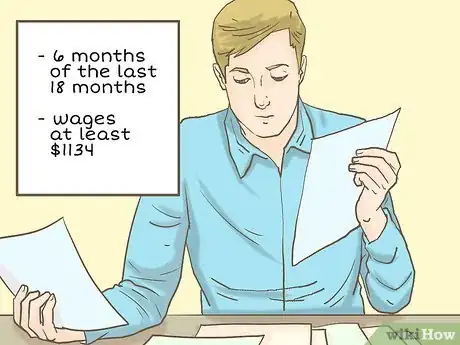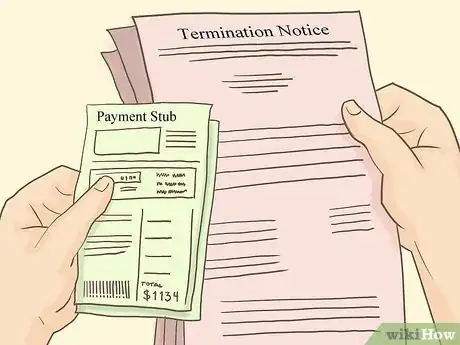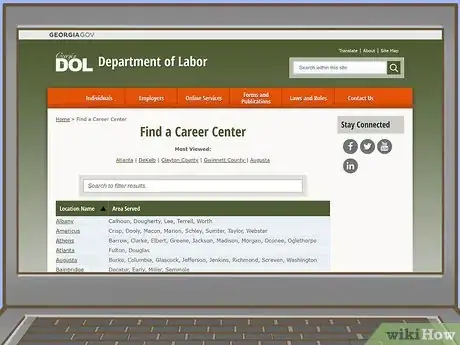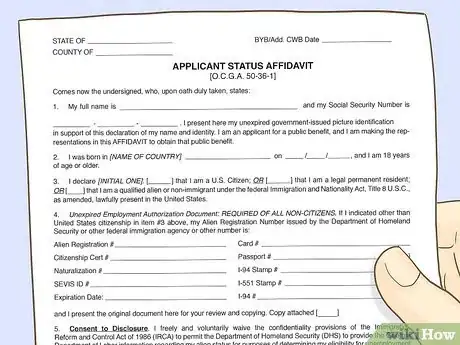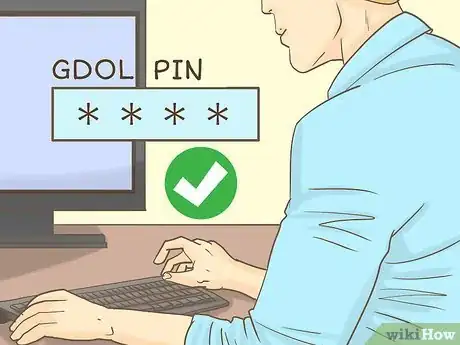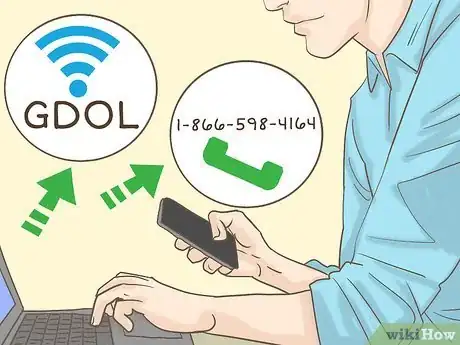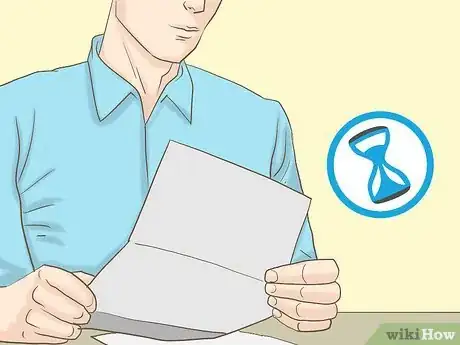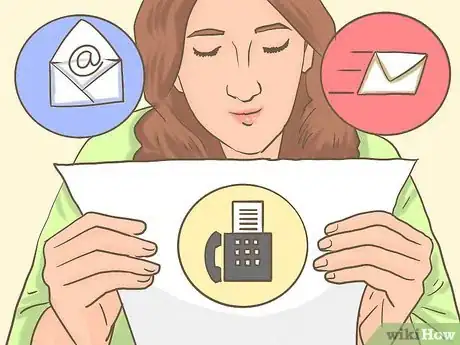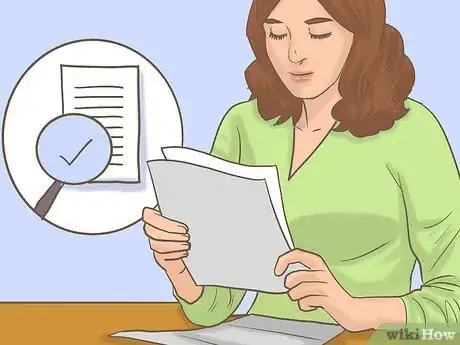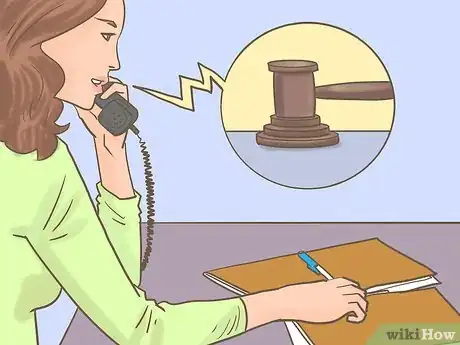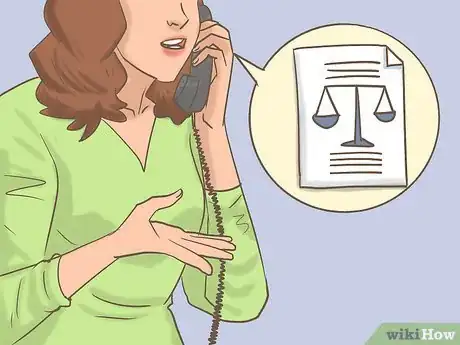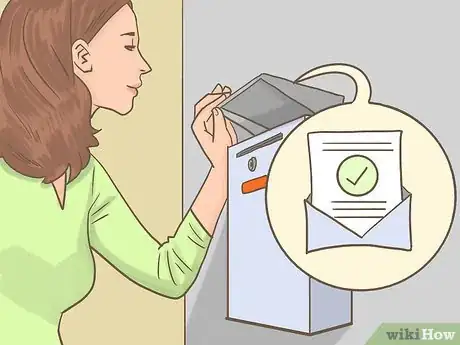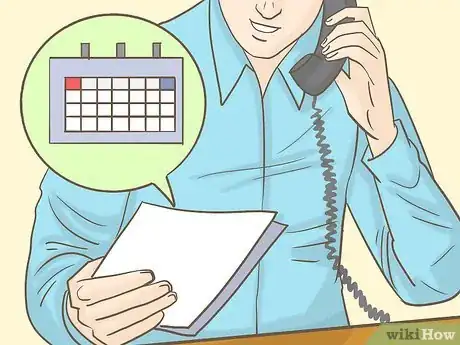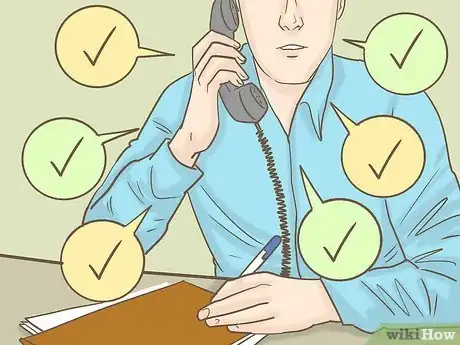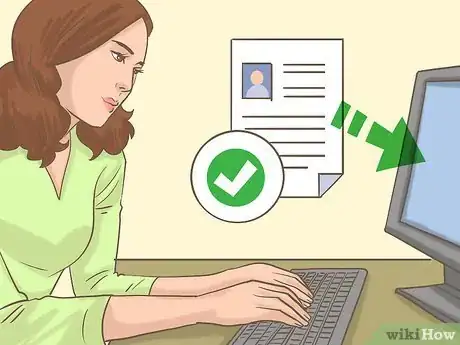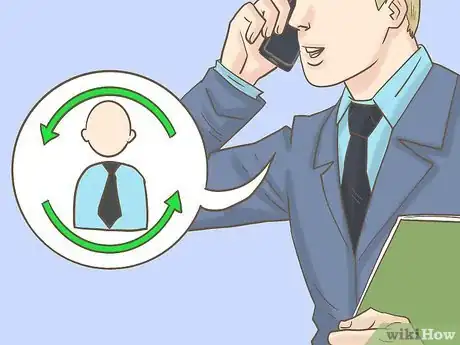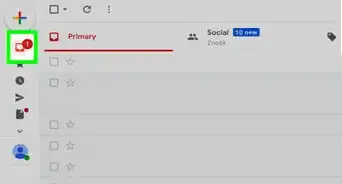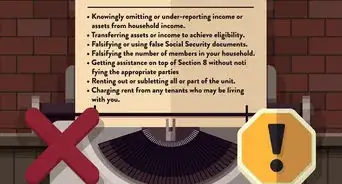This article was written by Jennifer Mueller, JD. Jennifer Mueller is an in-house legal expert at wikiHow. Jennifer reviews, fact-checks, and evaluates wikiHow's legal content to ensure thoroughness and accuracy. She received her JD from Indiana University Maurer School of Law in 2006.
This article has been viewed 12,437 times.
If you've suddenly lost your job, you're likely under a lot of financial stress. If you live in the state of Georgia, you may be able to get unemployment insurance benefits from the Georgia Department of Labor (GDOL). While these benefits won't replace your income, they may help ease the pressure on you as you search for a new job. You can file for unemployment in Georgia online, or in person at a local Career Center.[1]
Steps
Filing Your Claim
-
1Confirm that you qualify for benefits. You qualify for unemployment insurance benefits if you have sufficient wages over the past 2 years, lost your job due to no fault of your own, are able, available, and actively seeking work, and can prove that you are lawfully present in the United States.[2]
- To have sufficient wages, generally, you must have worked at least 2 quarters (6 months) in the 18 months before the date you filed your claim. During that time, your wages for 2 quarters must be at least $1,134.
- You could potentially qualify even if you quit your job if you had a work-related reason for quitting.
- You may also qualify even if you were fired, as long as you were fired for a reason other than misconduct. For example, if you and your manager got into a personal dispute and your manager fired you, you would likely qualify for unemployment benefits while you looked for another job.
-
2Gather documentation you'll need to fill out the benefits application. The application requires you to provide information about your work history for the past 2 years, including the name, address, and telephone number of each employer, the dates you were employed, your rate of pay, and total earnings, as well as information about your separation from each employer.[3]
- If you were given a separation or termination notice, it will likely have most of this information. You can find your rate of pay and total earnings on your most recent pay stub for that employer.
- If you want your benefits direct-deposited into your bank account, have your bank routing number and account number handy. If you've never had funds direct deposited before, you may want to call your bank and make sure it accepts electronic funds transfers.
Advertisement -
3Apply for unemployment insurance (UI) benefits. You can apply for UI benefits as soon as you become unemployed. The GDOL accepts new applications online, or you can go to a GDOL Career Center and apply in person. You don't need an appointment to apply in person, but you should be prepared to wait.
- You can complete your application online by visiting https://www.dol.state.ga.us/file_unemployment_claim.htm and clicking "Begin Unemployment Claim." If you file online, you must have a valid email address.
- If you want to apply in person, go to https://dol.georgia.gov/locations/career-center to find the nearest Career Center. GDOL Career Centers are open Monday through Friday from 8:00 a.m. until 4:30 p.m.[4]
-
4Complete an Applicant Status Affidavit. When you file your application for benefits, you must also fill out this affidavit to verify your identity. The affidavit must be accompanied by one of the government-issued identifications listed on the affidavit. If you applied online, you will receive an email with instructions on how to complete the affidavit.
- You can also download or print the form at https://dol.georgia.gov/document/unemployment-benefits/ui-applicant-status-affidavit/download.
- The affidavit must be signed in the presence of a notary public, who will verify your identity.
-
5Create a GDOL PIN to claim your weekly benefits. The first time you claim your weekly benefits, either online or over the phone, you will be asked to create a 4-digit number to use in connection with GDOL telephone and internet services. Pick 4 numbers that are easy for you to remember, but would be difficult for anyone else to guess.[5]
- Your PIN shouldn't be numbers connected to your identity, such as your birthday the last 4 digits of your Social Security number.
- Keep your PIN confidential, and don't share it with anyone, including your spouse.
-
6Claim your benefits every week while you wait for a determination. It may take up to a month for a claims examiner to review your application and make a determination on your benefits. In the meantime, file a claim each week for benefits. You will not be eligible to receive benefits for any weeks you failed to claim.[6]
- To file weekly benefits claims, go to the GDOL website or call 1-866-598-4164.
- When the claims examiner makes a determination, if you are eligible for benefits you will receive a payment for all weeks you have claimed.
-
7Receive your determination letter. Your application will be reviewed by a claims examiner. If they need any additional information, they will contact you. Otherwise, you will receive a letter in the mail letting you know whether you are eligible for unemployment benefits, how many weeks you can potentially receive benefits, and the amount of those weekly benefits.[7]
- If you are eligible to receive UI benefits, you should receive your first payment within 3 to 4 days of the date on your determination letter.
- If the claims examiner does not approve your claim, you can challenge that determination through the appeals process. Your determination letter will state the reason your claim was denied.
- You can also appeal if you believe the number of weeks or amount of weekly benefits was reached in error.
Tip: If 19 days have passed since you filed your application and you haven't received a determination letter, call 404-232-3001 (in Metro Atlanta) or 1-877-709-8185 (if you live elsewhere in Georgia).
Appealing Rejected Claims
-
1Write a request for an appeal. Copy the determination you want to appeal, state that you want to appeal it, and explain why you want to appeal it. Be as detailed as possible in your explanation. Include your Social Security number on your appeal request, along with your full name and contact information.[8]
- Most appeals are conducted over the phone. If you want to have an in-person hearing, you must request it specifically. Typically in-person hearings are only held if you can show a good reason why you need one, such as a hearing impairment or difficulty understanding the English language.
-
2Submit your request within 15 days of the date on your letter. The deadline for filing an appeal is the date on your determination letter – not the date you received it. You can submit your written request by email, fax, or mail.[9]
- Email your request to appeals@gdol.ga.gov. If you want to mail a printed request, send it to Georgia Department of Labor, 148 Andrew Young International Blvd Ste 525, UI Appeals Tribunal, Atlanta GA 30303-1734. You can also fax your appeal request to 404-232-3901.
- If you email or fax your request for appeal, the Appeals Tribunal will look to the date your request was received to determine whether it met the deadline. If you mail it, the Tribunal goes by the USPS cancellation stamp.
-
3Receive your hearing notice. Within 3 weeks of filing your appeal, you will receive a hearing notice in the mail. The notice will specify the date, time, and place of the hearing, the parties who will be participating, the name of the hearing officer, and the issues that will be discussed at the hearing.[10]
- If there are any specific dates or times that you won't be available, contact the Appeals Tribunal as soon as you receive your notice and let them know. Include any documentation you may have to support your reason, such as a medical excuse, job interview appointment, or jury duty notice.
Continue to make weekly claims. During the appeals process, make a weekly claim for every week you believe you are eligible for benefits. If you win on appeal, you will only be eligible for retroactive payment of weeks you've claimed.
-
4Notify the Appeals Tribunal if you've hired an attorney. You are allowed to have a representative at the hearing, or you can represent yourself. Most attorneys who specialize in unemployment provide a free initial consultation. If you're nervous about representing yourself, you can at least talk it through with someone who understands unemployment law.[11]
- You may also qualify for free or reduced-fee legal services. To learn more and apply for services, visit https://www.georgialegalaid.org/apply.
-
5Gather documents and evidence to present your case. You can use written documents, audio or video recordings, and live witness testimony to support your claims. Anything you present must be directly related to one of the issues listed on your hearing notice.[12]
- Written documents may include time cards, payroll records, warning notices, employee handbooks, or medical reports.
- You may request that the Appeals Tribunal issue a subpoena for documents, or for a witness to appear at your hearing. Any request for a subpoena must be made at least 3 days before the date of your hearing.
-
6Send your evidence to the Appeals Tribunal and the other side. Names and addresses to send your evidence are included on your hearing notice. You must send all your evidence before the hearing is scheduled. If you're sending it through the mail, make sure there's enough time for it to be received before the date of the hearing.[13]
- In most cases, the GDOL will be the other side. However, your former employer also has the right to dispute that you are eligible for unemployment benefits. In some situations, they may be involved as well.
- It's a good idea to send your evidence using a trackable method with a guaranteed delivery date, so you know when the Appeals Tribunal and the other parties involved have received it.
-
7Read through any documents you receive from the other side. Either the GDOL or your former employer may have documents or other evidence to support their claims that you are not eligible for unemployment benefits. Make sure you understand the information included in these documents before your hearing takes place.[14]
- If you have documents, witnesses, or other evidence that disputes anything in the documents you received, send those items around so that you can use them at the hearing.
- If any of the documents include information that you don't understand, you may want to meet with an unemployment attorney and have them go through it with you.
-
8Answer the phone at the date and time of the hearing. Most hearings are conducted over the phone. At the time of the hearing, the hearing officer will call you at the number you provided. Have all of your documents and evidence handy.[15]
- Try to take the call in a quiet place, apart from any distractions. Keep some paper and a pen nearby so you can take notes.
- The hearing officer will introduce themselves and explain the rules and procedures for the hearing. They will likely also take a moment to answer any questions you might have.
- If you have documents or other evidence that you want to be entered into the record, let the hearing officer know. Your evidence will be admitted provided all parties have received their copies.
-
9Present your case to the hearing officer. When it's your turn to explain the reasons for your appeal, speak in a loud, clear voice. Stick to the facts and explain specifically why you believe the claims examiner's determination was incorrect. Note any evidence you have to back up your statements.[16]
- If you're representing yourself, it's a good idea to make a brief outline of your case so that you can present it in an organized manner.
- You will also likely be asked questions by the hearing officer. Answer as completely and honestly as you can. If the hearing officer asks you anything that you don't know the answer to, say that you don't know. Don't guess or estimate.
-
10Wait for the hearing officer's decision. The hearing officer may let you know their decision informally at the end of the hearing. However, it isn't official until you get the written report in the mail. Typically the hearing officer's written report is issued within a day or two of the hearing.[17]
- The report outlines the decision made by the hearing officer and the reasons behind that decision.
- If you disagree with the hearing officer's decision, you have the right to a second appeal before the Board of Review. You must submit your appeal request within 15 days of the date of the decision.
Maintaining Your Eligibility
-
1Continue to file a claim for benefits each week. While receiving unemployment benefits, you must file a claim for benefits each week. You must wait until the end of the week. However, you have 2 weeks from the end of the week to claim benefits for that week.[18]
- You can file a claim for benefits on the GDOL website, or by calling 1-866-598-4164.
- As long as you were previously determined eligible, you should get your benefit payment within 2 to 3 business days after you file your claim. State and federal holidays may delay your payment.
-
2Answer all certification questions completely and honestly. After your initial claim, each claim you make requires you to answer 6 questions. These questions are intended to certify whether you met the eligibility requirements for the week you're claiming.[19]
- Remember to answer the questions specifically for the week you're claiming benefits – not the day you're filing the claim.
- Report any wages you earned for the week you earned them, even if you haven't been paid that money yet.
-
3Register for Employment Services with the GDOL. You can register for Employment Services at a local Career Center, or online. You aren't required to take advantage of the many resources available through Employment Services, but the GDOL highly encourages you to take advantage of them.[20]
- Online, you have access to job listings, tutorials, and information about education and training opportunities.
- At your local Career Center, you can receive job counseling, participate in workshops on topics related to unemployment and job loss, or get assistance with your résumé, among other resources.
-
4Submit weekly work search records to the GDOL. To remain eligible for unemployment benefits, you must prove that you are actively seeking employment. Maintain a record of every attempt you make to find a new job. Your work search record must include at least 3 new job contacts each week.[21]
- You can fill out the weekly work search form online and submit it electronically from the GDOL website when you file your claim each week.
- If you want to submit a paper form, you can pick one up at your local Career Center, or print the form available at https://dol.georgia.gov/sites/dol.georgia.gov/files/related_files/document/dol2798.pdf.
- Your weekly work search records may be randomly audited. If the GDOL cannot verify that the contacts were made, your benefits may be suspended, or you may have to pay some past benefits back.
Tip: If the GDOL refers you to a job, you must at least apply. If you fail to apply for suitable work or turn down a suitable position without a good reason, you may lose your benefits or have to pay back benefits you've already received.
-
5Notify the GDOL promptly of any changes in status. In general, you should report to the GDOL any information that might affect your benefit payments or eligibility. If something changes, such as if you move or get a part-time job, you must notify the GDOL immediately.
- If your address or contact information changes, you should also notify the GDOL of these changes as quickly as possible. If you file a change of address, you must also provide verification of your identity.
- If you find a job while receiving UI benefits, contact your local Career Center immediately by phone or email.
- You may have a part-time job and still receive UI benefits. However, your benefit amount will be reduced by the amount of money you earn at that job. The first $50 you make will not reduce your UI benefits.
Warnings
- UI benefits are taxable income and must be reported on both your state and federal tax returns.[23]⧼thumbs_response⧽
References
- ↑ https://dol.georgia.gov/sites/dol.georgia.gov/files/related_files/document/dol414.pdf
- ↑ https://dol.georgia.gov/sites/dol.georgia.gov/files/related_files/document/dol414.pdf
- ↑ https://dol.georgia.gov/sites/dol.georgia.gov/files/related_files/document/dol414.pdf
- ↑ https://dol.georgia.gov/sites/dol.georgia.gov/files/related_files/document/dol414.pdf
- ↑ https://dol.georgia.gov/sites/dol.georgia.gov/files/related_files/document/dol414.pdf
- ↑ https://dol.georgia.gov/sites/dol.georgia.gov/files/related_files/document/dol414.pdf
- ↑ https://dol.georgia.gov/sites/dol.georgia.gov/files/related_files/document/dol414.pdf
- ↑ https://dol.georgia.gov/sites/dol.georgia.gov/files/related_files/document/dol424b.pdf
- ↑ https://dol.georgia.gov/sites/dol.georgia.gov/files/related_files/document/dol424b.pdf
- ↑ https://dol.georgia.gov/sites/dol.georgia.gov/files/related_files/document/dol424b.pdf
- ↑ https://dol.georgia.gov/sites/dol.georgia.gov/files/related_files/document/dol424b.pdf
- ↑ https://dol.georgia.gov/sites/dol.georgia.gov/files/related_files/document/dol424b.pdf
- ↑ https://dol.georgia.gov/sites/dol.georgia.gov/files/related_files/document/dol424b.pdf
- ↑ https://dol.georgia.gov/sites/dol.georgia.gov/files/related_files/document/dol424b.pdf
- ↑ https://dol.georgia.gov/sites/dol.georgia.gov/files/related_files/document/dol424b.pdf
- ↑ https://dol.georgia.gov/sites/dol.georgia.gov/files/related_files/document/dol424b.pdf
- ↑ https://dol.georgia.gov/sites/dol.georgia.gov/files/related_files/document/dol424b.pdf
- ↑ https://dol.georgia.gov/sites/dol.georgia.gov/files/related_files/document/dol414.pdf
- ↑ https://dol.georgia.gov/sites/dol.georgia.gov/files/related_files/document/dol414.pdf
- ↑ https://dol.georgia.gov/sites/dol.georgia.gov/files/related_files/document/dol414.pdf
- ↑ https://dol.georgia.gov/sites/dol.georgia.gov/files/related_files/document/dol414.pdf
- ↑ https://dol.georgia.gov/sites/dol.georgia.gov/files/related_files/document/dol414.pdf
- ↑ https://dol.georgia.gov/sites/dol.georgia.gov/files/related_files/document/dol414.pdf
